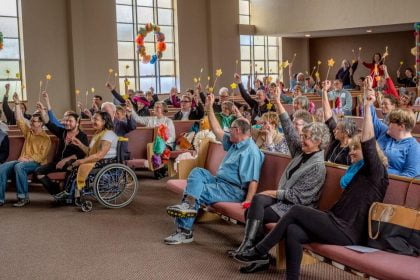At our annual Congregational Meeting on May 22nd, UUCT members will vote on adopting the 8th Principle:
“We, the members of the Unitarian Universalist Church of Tallahassee, covenant to affirm and promote: journeying toward spiritual wholeness by working to build a diverse multicultural Beloved Community by our actions that accountably dismantle racism and other oppressions in ourselves and our institutions.”
One criticism from some is that the proposed principle is too long and doesn’t fit with the other sev
en principles, which are brief, broad statements of intent.
UU leader Paula Cole Jones addressed this concern during UUCT’s “Building a Culture of Inclusion” workshop in mid-April. “There are as many ways to write the 8th Principle as there are people. We could talk about the language forever without getting anything done. So don’t get hung up on the language. Adopt it and move forward now with the essence of its meaning. That is what is important.”
Currently, the Unitarian Universalist Association’s Article II Study Commission is in a multi-year review of UUA purposes and principles, which will include consideration of the 8th Principle. In their charge to the commission, the UUA board specified: “Our commitment to anti-racism, anti-oppression, and multiculturalism is love in action, and should be centered in any revision of Article II.”
We anticipate that the 8th Principle will be reworded before it is adopted by the UUA– another good reason not to spend our time and energy on it.
Personally, as I have come to understand more about my own white privilege and complicity in upholding systemic racism and other oppressions, I have also come to see that every element of the proposed principle is important and needs to be there. The wording specifically expresses the need for accountable action because the current principles have not resulted in significant changes in the UUA or its congregations, despite the UUA’s commitment to anti-racism at a General Assembly twenty-five years ago.
The work to build Beloved Community is needed now. We can make this commitment at the congregational level. We can hold ourselves accountable to take the actions to fulfill this commitment.
One hundred sixty UU groups, mostly congregations, have already adopted the principle as it is written. There is something very powerful and compelling about so many individual congregations adopting the same words of commitment to engage in this important work!

